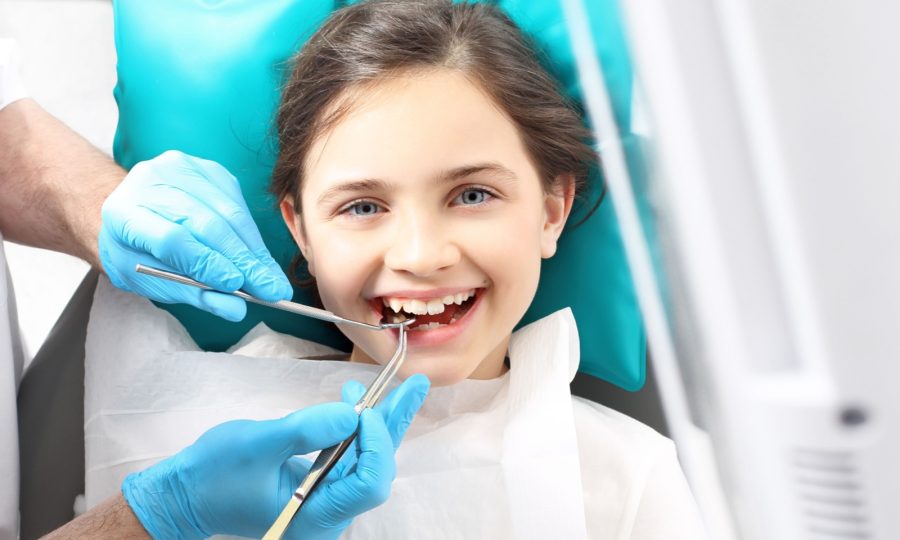How Long After Fluoride Can I Eat?
One common question following a fluoride treatment is how long to wait before eating. Generally, you should wait at least 30 minutes after a fluoride treatment before eating or drinking. This waiting period allows the fluoride to fully penetrate the enamel and provide maximum protection for your teeth.
Fluoride treatments are a part of our prevention strategy—they keep your teeth healthy and reduce the risk of developing cavities. Nonetheless, if you have concerns about your dental health, take a look at our various services and contact us today.
What Is Fluoride & Why Is It Important?
Fluoride is a naturally occurring mineral that strengthens tooth enamel, helping to prevent cavities and decay. When applied topically in a dental treatment, fluoride is absorbed into the outer layer of your teeth, reinforcing them against bacteria and acids from food and drink. Fluoride is especially beneficial for children, but it’s effective for adults too—providing protection against cavities and even reversing early signs of tooth decay.
Why Do I Need to Wait After a Fluoride Treatment?
After a fluoride treatment, it’s essential to let the fluoride absorb into your enamel fully. Eating or drinking too soon can wash away some of the fluoride, reducing its effectiveness. Waiting allows the fluoride to penetrate the enamel, maximizing its cavity-fighting benefits.

What to Expect During a Fluoride Treatment
A fluoride treatment is a quick and straightforward process that can be added to any dental visit. The treatment involves applying fluoride directly to the surface of your teeth, typically using a gel, foam, or varnish. After application, the fluoride remains on the teeth, where it can absorb into the enamel. The entire procedure usually takes just a few minutes and is painless.
After the fluoride is applied, you’ll be advised to wait before eating or drinking. This waiting period allows the fluoride to settle, making sure it stays on the teeth and offers optimal benefits.
How Long Should You Wait to Eat or Drink?
The general recommendation is to wait at least 30 minutes before consuming food or beverages. During this time, avoid rinsing, eating, or drinking to prevent the fluoride from being washed away. Following these instructions will help you get the most out of your fluoride treatment.
For children, it’s particularly important to follow these guidelines, as fluoride treatments are a significant line of defence against cavities in developing teeth.
How Fluoride Works to Protect Your Teeth
Fluoride works by strengthening the enamel, making it more resistant to acids produced by bacteria in the mouth. When fluoride penetrates your enamel, it helps to remineralize areas that may have started to break down. Fluoride not only protects against future decay but also aids in reversing early signs of enamel damage.
Eating After Fluoride: Tips for Optimal Dental Health
Once you’ve waited 30 minutes, you’re free to eat and drink, but here are a few tips to ensure that your treatment remains effective and your enamel stays strong:
Choose Tooth-Friendly Foods
After your fluoride treatment, it’s best to consume foods that won’t contribute to acid production in your mouth. Crunchy fruits and vegetables, such as apples, carrots, and celery, are great choices, as they help clean the teeth while you chew. Dairy products, like cheese and yogurt, are also beneficial, as they can neutralize acids and provide additional calcium for strong enamel.
Avoid Sugary or Acidic Foods
Sugary foods and acidic drinks can wear down enamel and reduce the effectiveness of fluoride treatments. Try to limit items like soda, candy, and citrus fruits, as these can increase the risk of decay. Instead, opt for water or milk, which have a neutral or positive impact on your oral health.
Stay Hydrated
Drinking water throughout the day is essential for good oral health. Water helps rinse away food particles and bacteria, reducing the risk of decay. After a fluoride treatment, staying hydrated also promotes saliva production, which plays a crucial role in protecting your enamel by neutralizing acids.
How Often Should You Get Fluoride Treatments?
Fluoride treatments are typically recommended every three, six or twelve months, often during regular dental checkups. However, depending on your dental health, age, and risk of cavities, your dentist at South Bolton Dental Centre may recommend more frequent treatments. For children, fluoride treatments are especially important as their teeth develop. However, adults benefit as well, particularly if they’re prone to cavities or have enamel wear.
The Benefits of Regular Fluoride Treatments
Regular fluoride treatments help prevent cavities, which can lead to more complex dental issues if left untreated. By strengthening your enamel, fluoride reduces the need for fillings, crowns, and other restorations in the future. Other benefits include:
- Cost Savings: Preventative treatments, like fluoride applications, are more affordable than restorative dental work.
- Pain Prevention: By reducing the likelihood of decay, fluoride treatments can help prevent the pain associated with cavities.
- Oral Health for All Ages: Fluoride treatments are safe and beneficial for both children and adults, making it a great addition to anyone’s dental routine.
Signs You May Need Extra Fluoride Protection
Certain factors make you more susceptible to cavities, and if you identify with any of these, consider asking your dentist about additional fluoride protection:
- Dry Mouth: Reduced saliva flow increases the risk of cavities, as saliva helps wash away bacteria and food particles.
- Gum Recession: If your gums recede, the roots of your teeth can be exposed, making them vulnerable to decay.
- Previous Cavities or Dental Work: If you have had multiple cavities or dental work, fluoride can protect these areas from further damage.
If you’re unsure about your risk, your dental team at South Bolton Dental Centre can help assess your needs and recommend the appropriate fluoride treatment frequency.
Maximizing the Benefits of Your Fluoride Treatment
Waiting at least 30 minutes after a fluoride treatment can help you maximize its protective benefits. By allowing time for the fluoride to fully absorb into your enamel, you’ll have the best defence against cavities and decay.
At South Bolton Dental Centre, we’re dedicated to providing comprehensive dental care, including fluoride treatments, to keep your smile healthy and strong. Reach out to us to schedule your next visit and explore how fluoride can contribute to a lifetime of better oral health.









